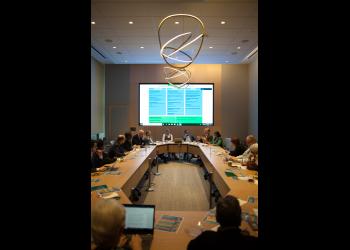Talking Global Governance and the Current and Future Role of the United Nations
Ambassadors, current and former UN officials and NGOs gathered at the Baha’i International Community's UN Office on 5 November for a discussion on global governance in an age of transition and the current and future role of the United Nations.
Participants discussed challenges surrounding global governance and sought solutions to current processes and structures at the UN.
“Conversations regarding contemporary global governance and UN reform have been taking place almost as long as the existence of the UN and there have been significant points in time when this has resulted in some meaningful reforms, but somehow they have always fallen short of the ideal scenario,” said Bani Dugal, Principal Representative of the Baha’i International Community to the United Nations.
“The twin processes of the disintegration of old institutions on the one hand and the blossoming of new ways of thinking on the other are evidence of a single trend which has been gaining momentum during the last century: a trend towards the ever increasing interdependence and integration of humanity.”
Arrangements intended to support an interdependent world are being called into question, while conceptions of exclusion and otherness are fracturing societies, Ms. Dugal added. However, this disruption has also offered valuable opportunities for current structures to be reassessed.
Among the speakers were three awardees of the New Shape Prize—an initiative by the Global Challenges Foundation that invites innovative thinkers to submit proposals on new models of global governance.
The award-winning proposal outlines a mechanism for two legislative bodies at the UN: one with national representatives and the second—a world parliamentary assembly—consisting of delegates who represent particular global issues, such as the environment, human rights, and others. The proposal also includes a strengthened executive branch with international security forces and a well-trained judiciary body that regularly makes binding decisions.
“It seems that the current [UN] system has very few credible defenders,” said Augusto Lopez-Claros, Senior Fellow at the School of Foreign Service at Georgetown University, and one of the awardees.
“People are very adept at saying how we won’t get things done. One of the challenges we face is systems inertia or the unwillingness to get things moving forward. This can lead to cynicism and disappointment. However, we are a hundred times more integrated than we were in 1945.”
Mr. Lopez-Claros said the creation of a world parliamentary assembly is critical to strengthening the democratic legitimacy of the UN and that it is important for UN officials to be better connected with the people they represent.
“The best way to defend national sovereignty is better global governance,” added Arthur Dahl, former Deputy Assistant Executive Director of the UN Environment Programme (UNEP) and one of the awardees alongside Maja Groff, an international lawyer based in The Hague.
Conversations also centered around current challenges facing global governance.
“We’re seeing global skepticism if not outright skepticism of global governance,” said John Wilmouth of the UN Population Division.
“This should not surprise us. There has been an erosion of trust in global governance. The primary reason is because the process of globalization hasn’t brought the promised benefits of equity for all.”
Mr. Wilmouth argued that “transparency, accountability and democracy” are effective elements in ensuring that global governance structures benefit all.
The views were echoed by the Ambassador for the Permanent Mission of Liechtenstein to the UN, Christian Wenaweser.
“The best way to defend national sovereignty is a better way of global governance, but the reality is that there are a lot of people who don’t believe that. They say that the best way to defend national sovereignty is to defend national sovereignty, and more than ever there are many people who question the system of the UN,” said Ambassador Wenaweser.
“We need to rally behind what we have and take an innovative look at the challenges ahead. This all has to be a rallying cry behind global governance, because we live in an age of crisis of global governance right now.”
The Deputy Permanent Representative of Sweden to the UN, Irina Schoulgin Nyoni added: "We live in a period where common sense is being challenged. We find ourselves frustrated, searching for new ways of dealing with the new situation we are facing. If the UN can not meet these new challenges, then where are we?"
______
Active in various global fora, the Baha’i International Community maintains representational offices to the UN in New York and Geneva, as well as regional offices in Addis Ababa, Brussels, and Jakarta.
The Baha’i International Community registered with the UN as an NGO in 1948 and currently has consultative status with the United Nations Economic and Social council (ECOSOC) and the United Nations Children's Fund (UNICEF), as well as accreditation with the United Nations Environmental Program (UNEP) and the United Nations Department of Public Information (DPI).
Follow the Baha’i International Community on Twitter, Facebook and Insta
______
For media inquiries, contact:
Rayyan Sabet
Senior Information Officer
(+1) 347-282-1482
[email protected]
